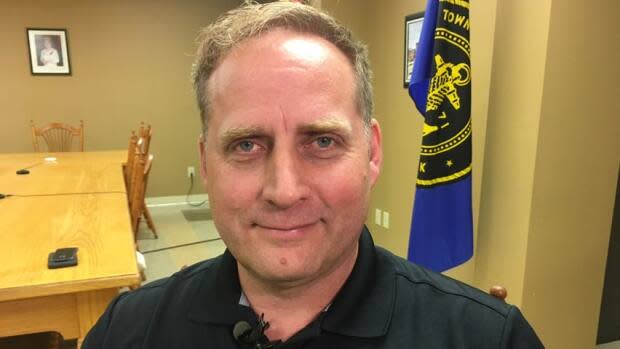New Brunswick sets up COVID-19 checkpoints at Maine border
Travellers entering New Brunswick from Maine are now facing screening from provincial officials in addition to federal border services.
Public Safety officers have established checkpoints along the U.S. border to boost enforcement of travel rules.
The U.S. land border has been closed since March to stop the spread of COVID-19, but several exemptions allow for essential travel to continue into Canada.
Some people who travel for work, such as daily commuters, can continue to cross regularly without self-isolating for 14 days. But New Brunswick has enforced stricter criteria, at times going beyond federal rules.
Travellers entering the province are required to apply and receive approval through the New Brunswick travel registration program.
Now the Department of Public Safety, which has enforced provincial travel restrictions since March, is starting spot checks along the Maine border.

Spokesperson Coreen Enos said peace officers and police officers may deny entry or issue fines of $240 plus fees if a traveller is not complying with the rules. Fines can reach $10,200 plus fees, if an offence is brought to court.
"We will be increasing our presence along the New Brunswick-Maine border to ensure that travellers coming into the province are here for essential reasons and have registered their travel and received an approval," Enos said in an emailed statement.
She said no tickets had been issued at the Maine border, and no travellers denied entry, as of Sunday. The province's legal ability to send travellers back to the U.S. is disputed.
Premier Blaine Higgs hinted at the changes in a news conference on Nov. 23.
"We will continue, however, to monitor the borders in the northern part of the province between ourselves and Quebec, and we are enhancing our monitoring of the U.S. border," he said
CBC News requested an interview with Public Safety officials and was told no one was available.
Checkpoint in downtown St. Stephen
The increased presence by peace officers is noticeable in St. Stephen, where traffic across the international border reduced to a trickle after the shutdown in March.
Mayor Allan McEachern said Public Safety has set up a checkpoint directly behind the Canada Border Services Agency port of entry, on Milltown Boulevard in the downtown.
"You'll see the officers' car parked there, and one or two officers will be standing there greeting the vehicles as they come through and questioning them," he said.
Peace officers have also been present throughout the town, which is currently under the orange phase, along with the rest of the Saint John health region.

McEachern said there's concern in the community that people with exemptions to cross for work are shopping at stores in the U.S. and could spread COVID-19.
"There are incidents where you're hearing of people taking those extra trips when they're not needed," he said.
New cases of COVID-19 are rising in Maine, with neighbouring Washington County reporting more than 60 cases in the last 14 days.
Calais, Maine, which is across the St. Croix River from St. Stephen, put the town on alert after more than two dozen cases were announced.
Tightened travel rules
New Brunswick has tightened isolation exemptions over the past few weeks in response to a surge in COVID-19 cases.
People who travel outside of the province for work are now expected to self-isolate for 14 days, with certain exceptions.
Daily commuters in border communities, those transporting commercial goods, and some workers for maintenance of critical infrastructure remain exempt.

Residents of Campobello Island are also permitted to drive into the U.S. to access essential goods and services, or to travel to mainland New Brunswick.
With the collapse of the Atlantic travel bubble on Nov. 23, nearly all travellers returning to New Brunswick must self-isolate for 14 days.
Province claims it can deny entry
The provincial government says approval by the Canada Border Services Agency does not guarantee entry into New Brunswick.
Travel restrictions only permit international visitors to enter for work, medical treatments, child care and custody arrangements, attend school, visit immediate family or for a compassionate reason.
When registering to enter the province, people must provide their reason for entry and contact information at least five days before travelling. This can be done through an online form or by phone.
Enos said Public Safety officers working near the Maine border are "empowered to return a traveller to a point of entry" and deny entry.
But an expert in border control says that falls beyond provincial powers.

Kelly Sundberg, an associate professor in the department of economics, justice and policy studies at Mount Royal University, said international border security and inspection are exclusively under federal jurisdiction.
"Once the CBSA has cleared them, they are entitled to remain in Canada for the duration of the time allotted," he said. "The province has no say in returning that person to the United States or removing them."
CBC News asked the Canada Border Services if it has returned travellers to the U.S. at the request of New Brunswick, and did not receive a response.
While the new measures are unique, some provinces have agricultural officials inspect livestock for disease and boats for noxious weeds after federal ports of entry.
Sundberg helped create the Canada Border Services Agency and has worked in customs and immigration. He said New Brunswick could strike an agreement for the agency to enforce its rules, which is already done for provincial limits on tobacco and alcohol imports.
"There's clearly a need for closer relations and interaction between provincial authorities and the federal government."


